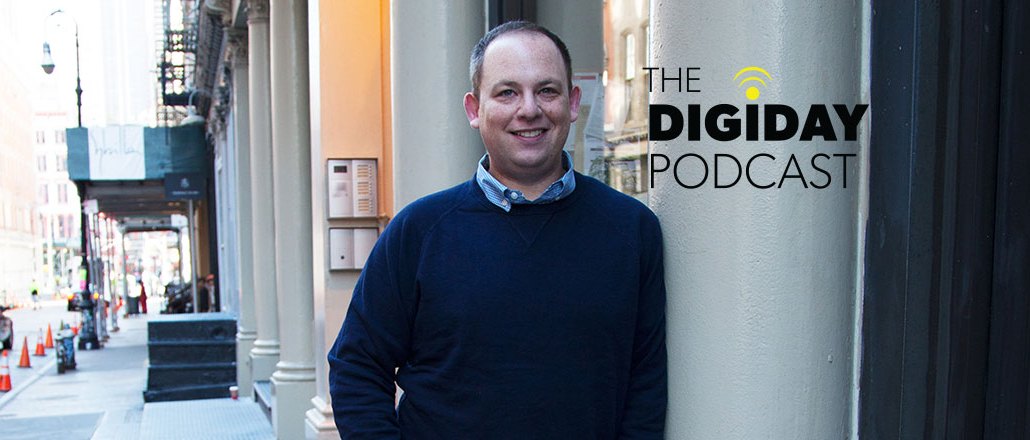Secure your place at the Digiday Publishing Summit in Vail, March 23-25
Deep Focus’ Ian Schafer: Ad agencies are in competition with publishers

The agency model is perpetually under threat. The usual suspects are well known: bean-counting procurement officers, grindingly efficient tech platforms and a resulting talent shortage.
But the new threat is from publishers, which are scrambling to set up their own content arms. Ian Schafer, CEO of digital agency Deep Focus, believes that agencies shouldn’t discount the competitive threat from publishers, as marketers increasingly look for ways to get around the many forms of ad avoidance.
“Content is code for, ‘How can I get around working with agencies?’” Schafer said on this week’s Digiday Podcast. “I’d rather work with a company that can guarantee me distribution. I’m getting creative with media dollars rather than getting creative with production dollars.”
“We look at that as a major threat,” Schafer said. “Any publisher that provides content to an advertiser I would consider a competitor unless we can make them our friend.”
Below are other highlights from the podcast:
Agencies are perpetually under threat.
The one constant of the agency business, it seems, is the prediction of its imminent demise that never seems to arrive. Ultimately, of course, agencies reflect their clients. And recent warnings for the agency business, such as the one issued by top PepsiCo marketer Brad Jakeman, typically don’t come to pass.
“It’s relatively easy to place the blame on agencies for not making marketers better,” said Schafer, who counts PepsiCo as a client. “He’s got a point. But then very large companies tend to work with very large agencies. And size is the enemy of creativity, generally.”
Being a small agency is hard.
The fast-changing digital media landscape, along with client pleas for their agencies to be more nimble, would seem to favor smaller shops. There is a rub, however. Most big marketers are efficiency-driven in their marketing decisions, which means negotiating large deals with large agency groups. That ends up setting the price for agency services, even when a smaller shop outside the large agency groups is hired.
“We have to prove that our rates as a smaller agency are competitive with the rates that they’re getting by paying other companies a lot more money. We have to deal with the efficiencies negotiated with other large companies. That’s very difficult. That makes the business that much harder for us.”
Publishers are driving down the cost of content.
Publishing is not an easy business these days. One bright spot has been the growth of marketing services units that provide content marketing. However, the publisher model is driven by advertising, so content services are usually bundled in as an add-on, Schafer said.
“If you’re going to get something for free, you can’t expect it to be good,” he said. “We are trying to force [marketers] to look at it from a creative-first approach, which sounds silly if your job is to create great content that people want to see.”
Ad blocking is a user experience issue, not an ad creative issue.
Ad avoidance is regularly pinned on poor creative. But ad blocking is a different beast, as it’s often a reaction to a poor user experience that’s caused by the modern ad system’s reliance on ingesting and crunching data to show ads based on automated decisions.
“Our quest for more data for ads to deliver people comes at a price, and that price is page load times, stability of websites,” Schafer said. “Things like that create a horrible experience for people. It could be the best ad in the world, but if it’s put in a horrible experience, that context will ruin whatever content is there.”
Traditional publishers are screwed.
The economics of media have changed drastically. And that’s taking a toll on legacy publishers with cost bases that are suited for a bygone world, Schafer said. However, the more, ahem, flexible publishers can still thrive.
“If you’re a lightweight publisher, it’s never been an easier time,” Schafer said. “You can game the system. You can buy distribution wholesale and sell it retail all day and know what your margin is. It sucks if you have a conscience and editorial integrity.”
More in Marketing

WTF is Meta’s Manus tool?
Meta added a new agentic AI tool to its Ads Manager in February. Buyers have been cautiously probing its potential use cases.

Agencies grapple with economics of a new marketing currency: the AI token
Token costs pose questions for under-pressure agency pricing models. Are they a line item, a cost center — or an opportunity?

From Boll & Branch to Bogg, brands battle a surge of AI-driven return fraud
Retailers say fraudsters are increasingly using AI tools to generate fake damage photos, receipts and documentation to claim refunds.





